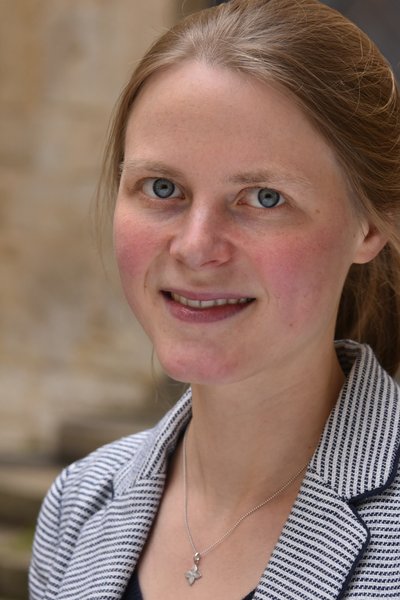Maja Menzel
PhD candidate (associated)
Church History

Research project
"The reception of Origen in the Annotationes in Epistulam ad Romanos of Erasmus of Rotterdam."
In 1516 Erasmus of Rotterdam published the first bilingual printed edition of the New Testament, the Novum Instrumentum omne. The critical Greek text and its Latin translation are of seminal importance for the New Testament biblical text considered authoritative in the early modern period (so-called textus receptus). Erasmus consulted medieval Greek manuscripts and all available commentary literature from antiquity, the Middle Ages and Renaissance humanism in order to place his critical biblical text on the broadest possible source basis. All the changes he made to the conventional Latin wording of the Vulgate were documented with numerous explanations in the "Annotationes" to the New Testament.
From the beginning, Erasmus' preoccupation with Paul's letter to the Romans is closely connected with his engagement with the thought and work of Origen, who wrote the first known commentary on the Letter to the Romans in the first half of the third century. In the course of his exegesis and translation of the Epistle to the Romans, this work in the Latin translation of Rufin of Aquileia became an important reference for Erasmus. The Annotationes in Epistulam ad Romanos testify to the fact that Erasmus - fully aware of the difficulties of the tradition and historical contextuality - consulted Origen on methodological, hermeneutical and theological questions as well as a reader of the Greek biblical text, which he himself intended to illuminate (cf. also Godin 1982).
In my dissertation, I would like to examine the perspectives from which Erasmus received Origen's literary work and to what extent this directed Erasmus' gaze towards the Letter to the Romans. In addition, the four other revised editions of the Annotationes in Romanos published during Erasmus' lifetime will be compared and questioned about changes and their reasons.
The targeted study of Erasmus' reception strategies, their backgrounds and consequences for the understanding of the Epistle to the Romans as a central text for the identity and history of Christianity should help to shed light on the significance of Origen for intellectual developments at the beginning of the early modern period.
Curriculum Vitae
Associate member of the Research Training Group "Autonomy of Heteronomous Texts in Antiquity and the Middle Ages".
- Mentorship: Prof. Dr. Katharina Bracht; Prof. Dr. Karl-Wilhelm Niebuhr (FSU Jena); extern: Prof. Dr. Dr. Alfons Fürst (WWU Münster)
Research assistant at the Chair of Church History at the Friedrich Schiller University Jena (Prof. Dr. Katharina Bracht)
- Dissertation project: The reception of Origen in the Annotationes in Epistulam ad Romanos of Erasmus of Rotterdam.
First state examination for the teaching profession (Religious education and Art)
Studies/ teacher training for Protestant Religious Education, German (Friedrich Schiller University Jena) and Art (Bauhaus University Weimar)
- Winter semester 2017/18: Practical semester at Christliches Gymnasium Jena
- Summer semester 2019: Semester abroad at the Ecumenical Institute/Lucian Blaga University Sibiu (Romania)
Studies/ teacher training for Protestant Religious Education, German (Friedrich Schiller University Jena) and Art (Bauhaus University Weimar)
Abitur at the Hans-Carossa-Gymnasium in Berlin
Presentations
2024
Vortrag bei der Ringvorlesung „Erasmus interdisziplinär“ an der Christian-Albrechts-Universität Kiel
2023
"The reception of the Church Fathers in Erasmus' Annotations on the New Testament" International Colloquium on the Legacy of Origen in Erasmus of Rotterdam, Università Vita Salute San Raffaele, Mailand (Italien)
2023
"Die Weimarer Herderkirche als Bildungsort" 7. Internationales Symposium zur Architekturvermittlung, Bauhaus-Universität Weimar,
2022
„Erasmus' 'Annotationes in Epistulam ad Romanos': An introduction to the text“ Internationale Konferenz „Die origeneische Bildung des Erasmus von Rotterdam“, Villa Vigoni, Menaggio (Italien)